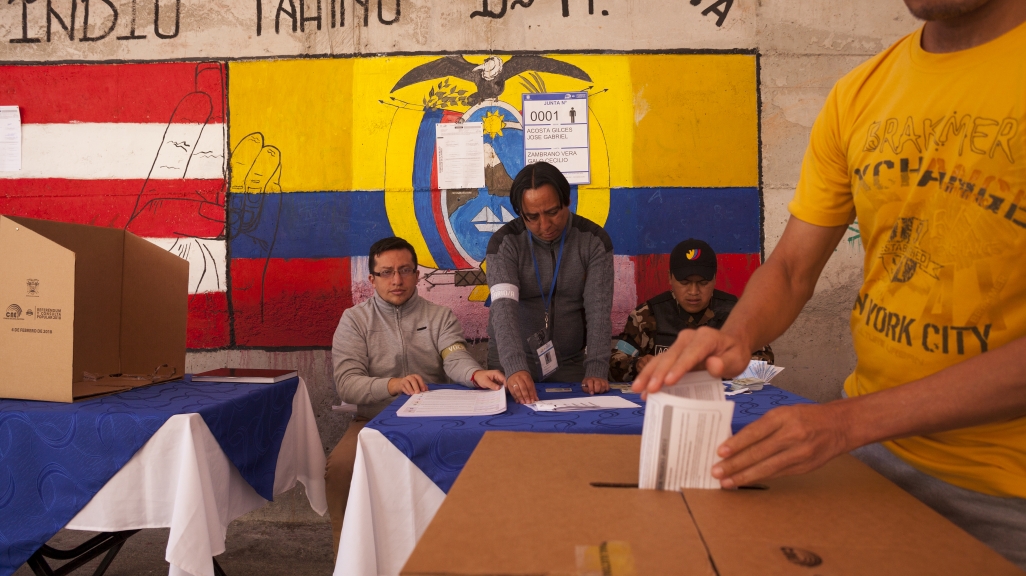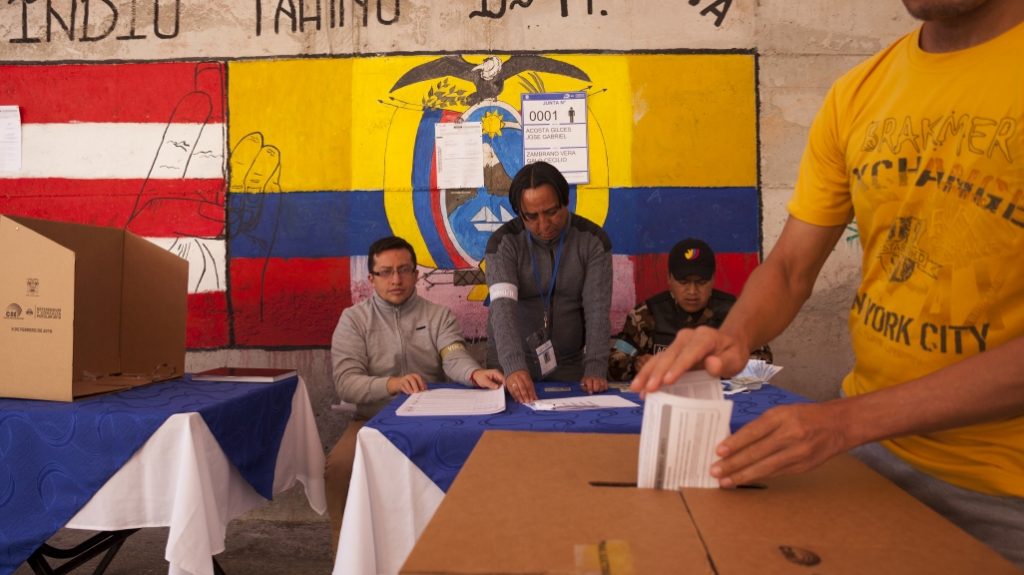Ecuador is close to breaking free from the authoritarian rule of Lenin Moreno and the IMF as polls predict Andres Arauz will win the country’s presidential run-off on April 11th.
A winner must have at least 40% of the votes and a minimum 10-point lead over second place to be confirmed after the first round of voting. Arauz, of Ecuador’s Union for Hope party (UNES), came in first with 33% of the vote. Carlos Perez of the Pachakutik party and Guillermo Lasso of the conservative alliance between the Creating Opportunities party (CREO) and the Social Christian Party (PSC) both garnered around 19% of the vote.
Despite not winning outright, Arauz’ performance in the first round was a shocking defiance of the suppression enacted by the outgoing government of Lenin Moreno, who only won 1.5% of the votes.
Moreno’s lack of popularity has seemed unsalvageable ever since protests erupted in 2019 against the IMF-imposed austerity that he hastily bowed to. Despite being elected as leader of the previously-progressive Citizen’s Revolution, leftists around the world quickly turned their back on his government as Moreno betrayed the preceding work of Rafael Correa with Citizen’s Revolution.
The standard dish offered by the IMF, indebtedness and austerity, had an especially prickly portion for progressive onlookers, with the surrendering of journalist Julian Assange widely-acknowledged to be a term of the deal. When the prices of gas and petrol increased by 200% thanks to the reforms, mass rebellion broke out. This rejection by the people was met with brutality that has grown in sophistication in the lead up to the election.
The lawfare to prevent a break from Moreno’s neoliberalism has been relentless. The basis was laid with a referendum in 2018 that bundled protections on many popular causes, such as child labor and environmental protection, with constitutional form. Its passing enabled Moreno to efficiently gut the fragile republic into a state apparatus better equipped to enforce right wing reign.
The hostile environment to dissidents played out in some predictable ways. Social activists and members of Correa’s former government live in exile, fearing the same fate as his former-vice president, Jorge Glas, who is imprisoned in Quito’s Latacunga maximum security prison on six-year sentence for over thirty dubious claims.
1,200 were jailed in response to the protests in 2019.
The constitutional referendum also allowed Moreno to fill key state positions with allies who dutifully played their part in attempting to prevent Arauz from gaining steam.
Legal attacks relentlessly tried to prevent the registration of Arauz’ ticket, delaying the registration until December 8th, only three weeks before the campaign began. Spurious challenges persisted after that. Luis Verdesoto, a right-wing ally who sits on the National Electoral Council (CNE) tried to disqualify Arauz as late as January 31st on the grounds that COVID-19 tests were being conducted at the party’s campaign events. This was ultimately dismissed due to the fact that this was commonplace among other candidates, none of who were challenged on the practice. The same body had repeatedly tried to postpone the election whilst Moreno’s minister of defense insisting in late January that ballots wouldn’t be printed.
Attacks on Ecuador’s democracy have come from the outside too. Apart from the American links of Arauz’ two main challengers, Lasso and Perez, the right-wing Colombian government has partaken in an audacious attempt at election interference to. One hard-right magazine Semana claimed an investigation had shown them that Arauz was being funded by the ELN, a Colombian Marxist-Leninist Guerilla organization. Despite the audacity of the claims, the ELN is a group of several thousand who hold few resources. Colombia’s attorney general flew to Ecuador to discuss the “allegations”.
Most followers of this theatrical bit had any concerns laid to rest when the widely-circulated video of supposed ELN guerillas expressing support for Arauz had any façade of authenticity stripped by an ornithologist. Manuel Sanchez, who’s also a bird guide, pointed out that the audible whistle of a pale-browed tinamou would not be heard in the “Colombian Jungle” as the video’s caption claims, since it can only be found in a tiny forest ecosystem in Western Ecuador and north-west Peru.
The ELN refuted such allegations and stated “that [the] pro-government outlet has joined the information war led by far-right-wing media in Latin America to interfere in the neighbouring country’s elections.”
Pending any further legal onslaughts, Arauz, who’s party was also the biggest winner in the parallel government elections, will face one of two opponents in April.
The initial counts have Lasso slightly ahead on votes, with Perez only trailing by about 0.3% points. After the two men met both agreed that they wanted a recount. However, the request has been postponed after the CNE had an unexplained absentee and an abstention on the movement to allow the recount.
The right’s consistent ability to organize complex anti-democratic procedures has made sceptics anxious about the delay. With the CNE’s recent record of tampering and the likelihood that Perez and Lasso would support one another before Arauz, there’s no knowing what might come next as the Ecuadorian people struggle to elect the most popular candidate.
Mali Kakembo, is a member of the YCL’s Wales district




